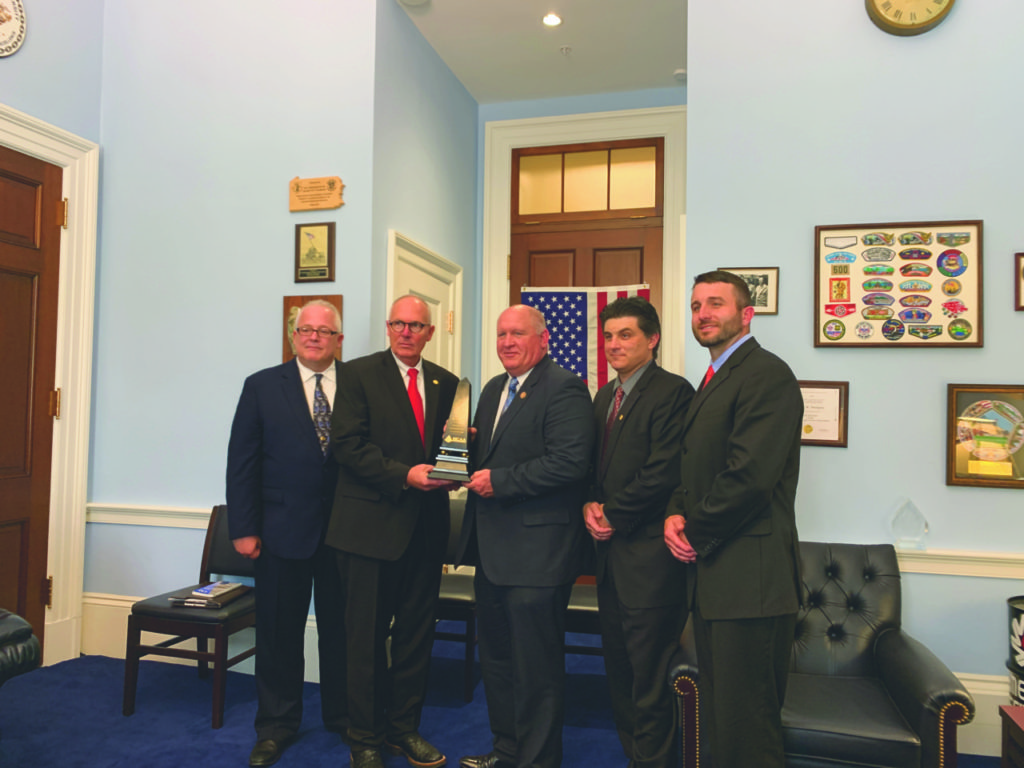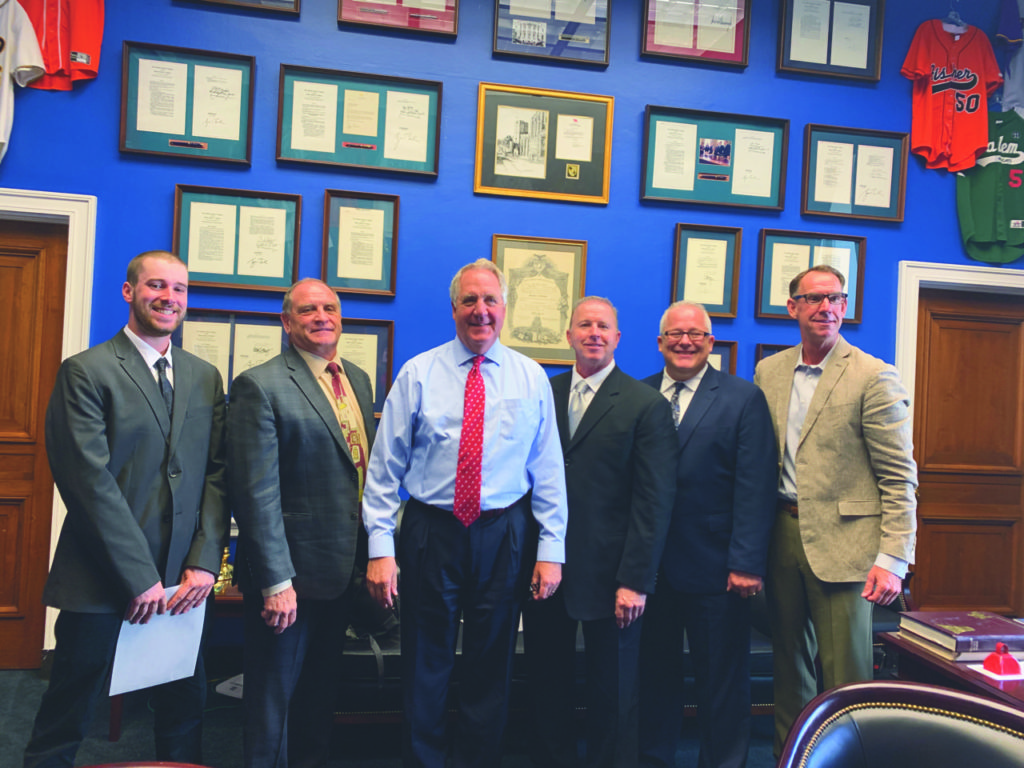2019 MCAA Legislative Fly-In Recap
Words: Cass Stern
Words: Cassandra Stern
Photos: MASONRY Magazine
Both the weather and the company were exceptionally welcoming throughout this year’s Mason Contractors Association of America (MCAA) annual Legislative Fly-In. MCAA representatives enjoyed a fast-paced schedule that managed to squeeze in plenty of work with a little bit of fun. After a tour of the Federal Bureau of Engraving and Printing, dinner at Old Ebbitt Grill, and a night bus tour of the Capitol concluded the first evening, it was all business for the remainder of the Conference. The remaining time in Washington D.C. was spent meeting with Representatives and Senators from their home states on several issues of crucial importance to MCAA members.
As in years past, this year MCAA representatives focused on four main talking points throughout their meetings with Senators and Representatives, including Senator Tammy Duckworth (D-IL), Representative John Simkus (R-IL) and Representative Sean Casten (R-IL). By emphasizing the enormous positive and negative impacts of various current legislation on the masonry industry in recent years, this year’s goal was to affirm the need to improve federal laws and regulations that protect industry members. TThis year’s top talking point concerned H.R. 1740- the Workforce for an Expanding Economy Act, a bill that creates a system for employers and potential immigrant laborers to be required to receive a permit to work in the U.S., and ease some of the worsening skilled labor shortages facing the industry today.
H.R. 1740, sponsored by Rep. Lloyd Smucker (R-PA) asserts the intention to “amend the Immigration and Nationality Act to provide for an H–2C nonimmigrant classification, and for other purposes.” The Bill states “section 101(a)(15)(H)(ii) of the Immigration and Nationality Act (8 U.S.C. 1101(a)(15)(H)(ii)) is amended by inserting “(c) who is coming temporarily to the United States to perform services or labor for a registered non-agricultural employer in a registered position.” This means that, if passed, the Bill will amend current legislation and outline a joint applicant-employer application process. This process would afford qualified applicants two years of temporary employer-sponsored citizenship, which is more accessible than the current process in place. The application can be renewed twice before the applicant would then need to apply for a different citizenship classification designation through another process. H.R. 1740 also provides strict but manageable guidelines which define specific terms for the application process and the rules and regulations that qualified applicants must adhere to throughout the duration of their work visa.
This means that, if passed, the Bill will amend current legislation and outline a joint applicant-employer application process. This process would afford qualified applicants two years of temporary employer-sponsored citizenship, which is more accessible than the current process in place. The application can be renewed twice, before the applicant would then need to apply for a different citizenship classification designation through another process. H.R. 1740 also provides strict but manageable guidelines which define specific terms for the application process and the rules and regulations that qualified applicants must adhere to throughout the duration of their work visa.
Without a doubt, the potential impact this legislation could have on the masonry industry is big. By relaxing current immigration restrictions, employers will be freer to enter into mutually beneficial business relationships that, in turn, enrich and improve the surrounding community. MCAA members made great use of their time throughout the Masonry Industry Legislative Conference advocating on behalf of H.R. 1740 and showing their support for the passage of this crucial legislation. Not only will this bill improve people’s lives by smoothing the road to citizenship, but it also affords employers the ability to grow their businessesby restoring historical landmarks and encouraging economic growth through an expanded workforce to complete new construction.

MCAA’s second important talking point concerned the incredibly concerning issues of industry employers purposefully misclassifying laborers on their tax forms. Some contractors in the masonry industry will intentionally misclassify workers as independent contractors, rather than true employees, in order to dodge payroll taxes, insurance premiums, and other troublesome employment expenses in an effort to increase overall company profits. In MCAA representative’s conversations with Senators and Congressional Representatives, there was passionate support of inciting Congress to pass legislation allowing the Department of Labor the ability to levy massive financial penalties on employers found guilty of intentionally misclassifying employees. There is hope that by incentivizing employers to abandon this abusive practice, masons and other similar workers will reap the benefits of better overall protection within their industries.
In an effort to tackle the industrial labor shortage issue from multiple angles, MCAA representatives at the Legislative Fly-In Conference also rallied their support for the Rebuild America’s Schools Act. Discussions of a broad infrastructure investment package that would afford organizations like MCAA the funding to repair our nation’s public schools were commonplace throughout the Conference, and a cheerful expression of support for some potentially life-altering legislation. With the freedom to devote time and resources into making local schools safer, more modern, cleaner, and more energy efficient communities will flourish. In addition to the initial economic boost to the local area, students will learn better and easier in healthier environments, and are able to thrive in well-equipped educational spaces. Buildings can now be designed to foster and enhance learning, and by enriching the next generation and providing them with the places and tools that they need to succeed, they will be capable of boundless achievement in the future.
In addition to constructing and maintaining safer schools, the final talking point discussed at the Masonry Industry Legislative Conference this year regarded existing OSHA regulations. MCAA and their member companies continue to be concerned with new regulations being pushed for by outside groups and pursued by the Occupational Safety and Health Administration (OSHA). Safety is and will remain to be one of their top priorities for their workers and in the workplace. Their employees are their best assets and often they are considered to be family as they have worked with these companies for many, many years. Some issues of concern include:
Silica exposure rule
Beryllium limits
Standard Improvement Project IV
RFI for forklifts
Heat Stress rules
MCAA and their members remain concerned that employees at OSHA do not have a deep enough understanding of the nature of construction sites and the impact that their rules have on a real-world construction site. It is their hope that any future development of rules and regulations must include industry participation to have effective and practical solutions.

MCAA’s overall efforts in highlighting and emphasizing important issues and legislation were well received by the Congressmembers who met with MCAA representatives throughout the Conference. In addition to a multitude of positive comments and feedback throughout these meetings, there was also a lot of support for MCAA as an organization of the masonry industry as a whole. These positive reactions only reinforce the importance of MCAA’s continued efforts and attendance of conferences like this one on behalf of all industry members in order to continue to enact clear and decisive change in people’s daily lives.
During the conference, MCAA President and CEO Jeff Buczkiewicz and various members of the MCAA in attendance happily presented the yearly “MCAA Freedom and Prosperity Award” to four Congressmembers who have consistently been ardent advocates on behalf of small businesses and to the industry overall.
This year’s award-winners are:
Representative Raja Krishnamoorthi (D-IL)
Representative Glenn Thompson (R-PA)
Senator Bob Casey (D-PA)
Senator Mike Enzi (R-WY)
Though brief, the 2019 Legislative Fly-In was a resounding success in achieving measured progress towards some incredible goals for the masonry industry. In addition to showing support for H.R. 1740, MCAA representatives also advocated for stricter regulations regarding OSHA and employee misclassifications by contractors throughout the masonry industry, as well as emphasizing the need for the Rebuild America’s Schools Act. This year, MCAA representatives focused on accelerating the legislative process through increased awareness of pressing industry issues, like a decreased labor force, and demonstrating support for innovative and easily implemented proposed solutions. In doing so, MCAA representatives laid the groundwork for Congress’s continued efforts to better conditions for masons everywhere, and will continue to do so next year!